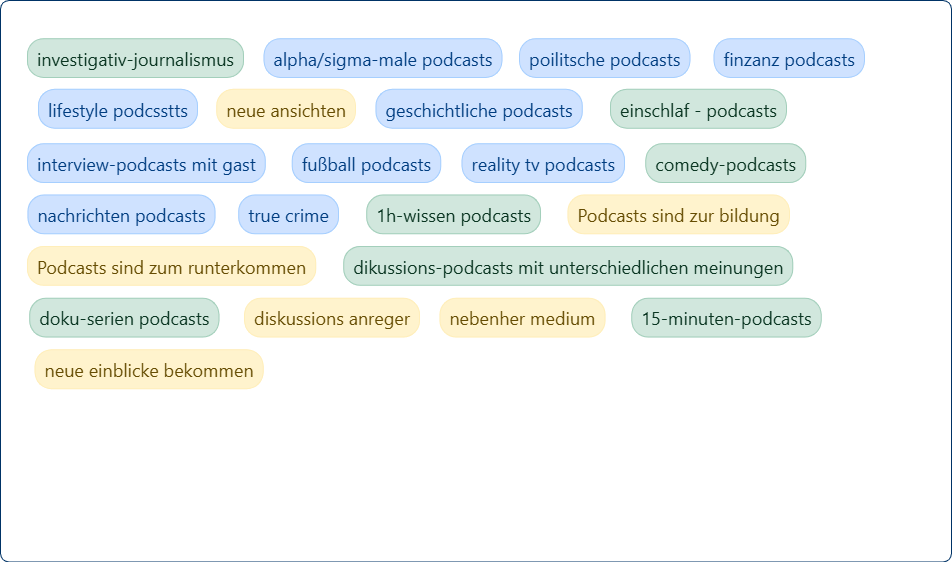Today's Session
Welcome to the first session! Today, we will cover the essential organizational details, get to know each other's research interests, and introduce the thematic focus for our semester projects.
- Introduction & Getting to Know Each Other
- Organization, Schedule, and Course Objectives
- Forms of Work and Proof of Performance
- Thematic Introduction: Podcasts as a Field of Research
- First Homework and Next Steps
Let's Get to Know Each Other
About Me
My name is Andreas Reich, and I will be guiding you through this project seminar. My research focuses on computational methods and AI technology and how we can adapt these tools for our research in the social sciences.
You can always reach me via email at: andreas.reich@uni-hohenheim.de
About You
Reflection: Your Interests
Before we dive in, take a moment to reflect on your own interests. This will help you in finding a group and a topic later on.
- What's your name?
- What area of (media) research are you most interested in? (e.g., effects, usage patterns, specific content, platforms)
- Expectations? Any particular wishes regarding this course or a specific method you'd like to learn more about?
Our Course Philosophy: The Research Expedition
This isn't a typical lecture course. Think of it as a workshop, a lab, a flight simulator for real-world research. My role is to be your guide, but you are the explorers. The structure below isn't a checklist; it's the map for our expedition. Click on each stage to reveal its purpose and a mini-interactive demonstration.
Phase 1 in Detail: The Blueprint (Units 1-4)
This initial phase is the most critical. It's where you lay the entire foundation for your project. A strong start here saves immense amounts of time and frustration later. Your group's main goal is to move from a broad interest in "podcasts" to a specific, answerable, and scientifically relevant research question.
Your Key Tasks:
-
Topic Brainstorming & Selection (Unit 2): Based on our brainstorming, you'll narrow down your interests. Are you fascinated by the parasocial relationships in true crime podcasts? The effectiveness of ads in comedy podcasts? The framing of political news in daily briefings? You will select one concrete avenue to pursue.
-
In-depth Topic Study (Units 3-4): This is your deep dive into the scientific literature. You'll move beyond casual knowledge to understand the state of research. Your goal is to create a "State of Research Matrix" to answer:
- What studies already exist on this specific podcast sub-topic?
- What theories (e.g., Uses and Gratifications, Parasocial Interaction Theory, Framing Theory) have been used?
- What methods have been applied (surveys, experiments, etc.)?
- Most Importantly: Where is the research gap my project can fill?
-
Formulating the Research Question & Hypotheses: At the end of this phase, you will have a crystal-clear research question (e.g., "How does the use of narrative sound design in historical podcasts affect listeners' perceived authenticity?") and, if applicable, testable hypotheses.
Outcome of Phase 1: A well-defined research topic, a solid grasp of the relevant literature, and a precise research question that will guide the rest of your project.
Workload & Requirements
- Workload: This is a 6 ECTS course, equivalent to ~180 hours of work (about 7 hours/week), including classes and self-study.
- Course Requirements: Regular attendance, active participation, and independent group work are essential. Think of me as your expedition guide, here to provide support and direction.
Thematic Introduction: Podcasts
The thematic focus for this semester's research projects will be on podcasts. This medium has evolved from a niche format to a central part of the media landscape, offering a rich field for communication research.
The Rise of Podcasts
To understand why we're focusing on podcasts, let's look at their explosive growth. This medium has moved from a niche interest to a central pillar of the media landscape in just a few years.
Brainstorming Session: Your Experience with Podcasts
Let's start by exploring our own relationship with this medium. Think about the following questions:
- Do you use podcasts?
- Which podcasts do you listen to? (Names, genres like true crime, comedy, news, science...)
- In what situations do you use podcasts? (e.g., commuting, cleaning, working out, falling asleep)
- How often and for how long do you listen? (e.g., daily, "in phases," entire episodes at once)
- What motives do you have? (e.g., entertainment, information, focus, parasocial interaction)
- How would you rate the current significance of podcasts compared to other established media formats (like TV, radio, or social media)?
Your own experiences can be a great starting point for developing a fascinating research question!
Results of our Brainstorming:

Download results as Excel CSV sheet:
Hier die Excel Downloaden.Workshop: Find Your Research Tribe
This short game will help you discover peers with similar research interests and different talents. For each of the 5 rounds, a question will appear. You'll have 30 seconds to choose the option (A, B, C, or D) that best fits you by moving to the respective corners of the room. Let's find your tribe!
First Steps & Homework
To get our projects rolling, please complete the following tasks by our next session:
- Group Formation (3-4 People): Find your potential project group for the semester. If you have any difficulty finding a group, please contact me, and we'll find a solution. We'll fix the groups next week
- Initial Brainstorming: Research the topic of "podcasts" and come up with initial suggestions for topics, research questions, and problems. What could be interesting and relevant to investigate? A good starting point is the literature file provided on Ilias.
- Discuss & Prepare: Discuss your suggestions within your group. Each group should bring 2-3 initial project ideas to our next session.
Good luck, and I look forward to seeing you next week!
